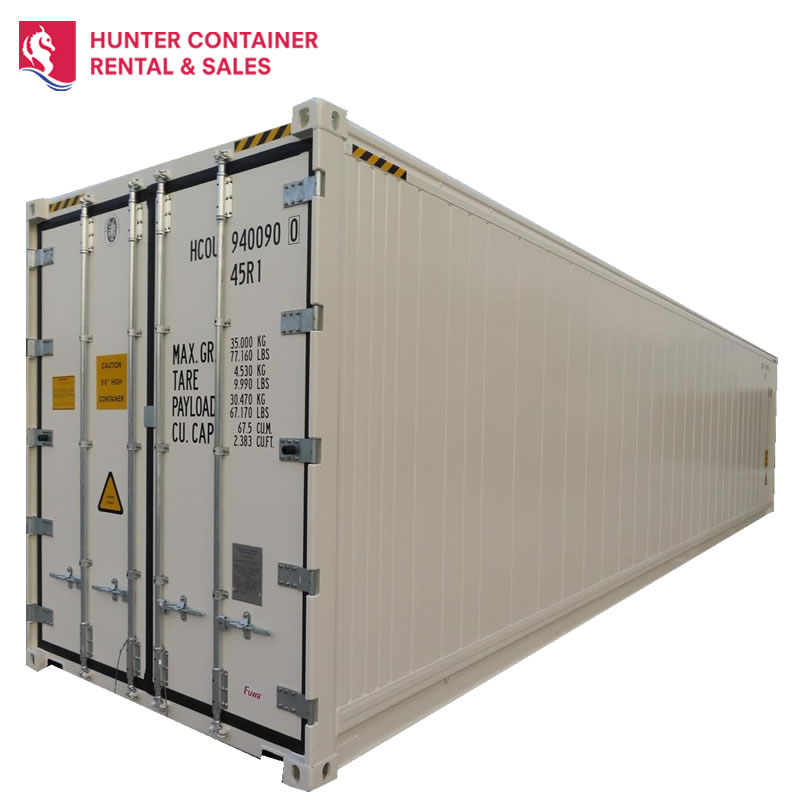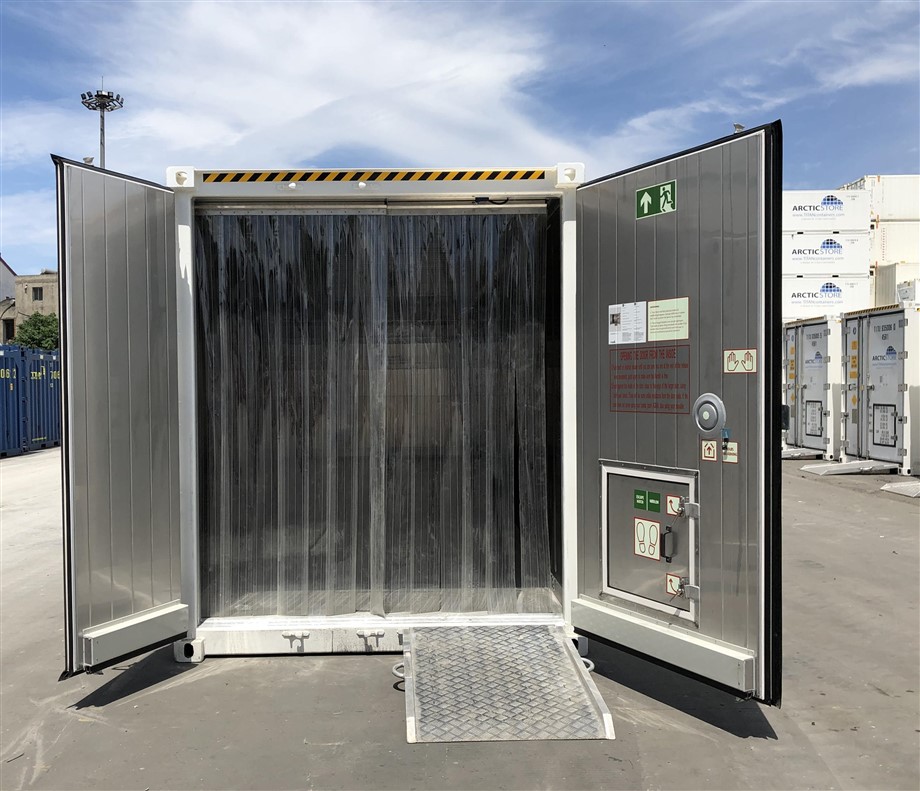Everything About Cold Store Containers: Vital Insights for Your Storage Demands
Cold store containers play a vital duty in the preservation of disposable goods. They can be found in various types, including cooled and shielded units, each created for particular storage needs. Comprehending the advantages and crucial features of these containers is essential for services aiming to maximize their operations. As the need for effective storage options grows, checking out the different choices readily available can cause informed decisions that influence both success and sustainability. What variables should one think about when picking the best container?
Types of Cold Storage Space Containers
Cold storage space containers can be found in various types, each developed to satisfy details temperature level control needs. Among the most common types are refrigerated containers, which maintain temperatures between 0 ° C to 10 ° C, making them suitable for disposable products like fruits, vegetables, and dairy products. Another type is the deep freezer container, which operates at temperature levels listed below -18 ° C, perfect for lasting storage space of icy products such as meats and fish and shellfish.
Protected containers supply temperature level stability without active cooling, making them useful for temporary transportation of temperature-sensitive products. Furthermore, there are portable freezer devices, which supply adaptability in places and are commonly made use of in events or seasonal procedures. Blast refrigerators swiftly minimize the temperature of hot foods, ensuring safety and security and top quality. Each kind serves an unique function in numerous sectors, from food service to pharmaceuticals, highlighting the significance of selecting the right container for particular storage space demands.

Advantages of Making Use Of Cold Store Solutions

Furthermore, cold store solutions extend the life span of things, lowering waste and enhancing success for businesses. By effectively handling supply with appropriate temperature level control, firms can enhance their supply chains and enhance operational performance.
In addition, freezer centers enable for adaptable storage space choices, accommodating various volume requirements and seasonal variations in need (used 40ft refrigerated shipping containers). This adaptability assists organizations respond quickly to market adjustments
Using cold storage space solutions can assure conformity with health and security regulations, safeguarding both companies and customers. Overall, the critical use of cold storage improves item management while promoting sustainability and economic feasibility.
Key Functions to Seek in Cold Store Containers
When choosing freezer containers, numerous key functions advantage cautious factor to consider to safeguard peak performance and integrity. Temperature control capacities are necessary; containers should maintain constant temperatures ideal for details items. Insulation quality also plays a considerable duty, as remarkable insulation decreases energy intake and enhances temperature security.
Next, convenience of accessibility and loading is vital; containers need to use user-friendly styles for reliable handling and company. Toughness is another essential aspect; weather-resistant products guarantee longevity and guard contents versus environmental aspects.
Furthermore, mobility attributes, such as built-in wheels or raising factors, promote transportation, while customizable formats enable customized storage solutions.
Last but not least, checking systems, including temperature alarm systems and remote tracking, give real-time updates, making sure that conditions remain excellent. By focusing on these attributes, customers can pick cold store containers that fulfill their functional needs properly.
Choosing the Right Freezer Container for Your Requirements
Picking the right chilly storage space container requires a thoughtful evaluation of functional requirements and certain demands. Factors such as the kind of products being stored, temperature level of sensitivity, and quantity should be prioritized. As an example, perishable food items may require containers with rigorous temperature controls, while drugs may call for precise conditions to keep effectiveness.
Furthermore, prospective individuals must take into consideration the container's dimension and mobility. A larger unit might be necessary for mass storage space, while smaller sized, mobile alternatives can be excellent for short-term or on-site needs. Insulation quality and energy performance are additionally important, as these will certainly influence functional expenses and temperature stability.
Lastly, conformity with sector guidelines and requirements is vital, especially in industries like food and healthcare. By very carefully assessing these aspects, customers can choose a cold store container that successfully satisfies their unique needs and assurances optimal storage space conditions.
Ideal Practices for Preserving Cold Storage Issues
Preserving ideal cold store problems is necessary for protecting the quality and safety and security of temperature-sensitive items. On a regular basis keeping an eye on temperature and moisture levels is vital; using trusted digital thermostats and hygrometers can offer exact readings. Correct insulation of cold storage space containers aids reduce temperature level fluctuations and energy loss.
Applying a first-in, first-out (FIFO) system ensures that older supply is used before more recent supply, decreasing waste (used 40ft refrigerated shipping containers). In addition, maintaining an organized design within the storage room permits much better air flow and decreases the risk of cross-contamination
Routine upkeep examine tools, such as compressors and seals, are essential to stop malfunctions. Personnel training on finest techniques for filling and unloading products assists preserve temperature level stability. Keeping doors closed as much as possible limits heat exchange, guaranteeing that the cold storage setting remains secure and effective in preserving important products.
Cost Considerations for Freezer Solutions
When evaluating freezer remedies, it is vital to consider the first financial investment expenses alongside ongoing functional costs. A detailed malfunction of these expenses can reveal substantial lasting cost savings potential for organizations. Recognizing these economic elements helps stakeholders make informed choices regarding their freezer needs.

First Financial Investment Prices
The economic landscape of cold store containers provides different preliminary investment expenses that companies should think about. These costs generally include the purchase or rental rate of the containers, which can differ based upon kind, dimension, and insulation quality. Additionally, expenditures connected to retrofitting existing structures to accommodate freezer needs to be factored in, especially if specialized equipment is called for. Installment expenses, including electric work and refrigeration systems, likewise contribute to the total first financial investment. Businesses need to not ignore transportation costs for supplying containers to their preferred location. Possible personalization alternatives, such as shelving or temperature monitoring systems, can additionally impact the first financial expense. Careful budgeting for these variables is necessary for effective cold store implementation.
Functional Expenses Malfunction
Operational costs for cold store remedies encompass a number of critical expense factors my site to consider that companies have to navigate. Secret variables include power prices, which can be substantial because of the need to maintain reduced temperatures. Upkeep expenditures are also considerable, as normal servicing is vital to assure equipment operates efficiently and stays certified with health and wellness requirements. In addition, labor prices might arise from the requirement for specialized personnel to monitor the storage and handle atmosphere. Insurance policy expenses are another consideration, as business need to secure their financial investments versus possible losses. Any kind of possible governing conformity expenses need to be factored in, as services may need to invest in systems that stick to food safety and security and ecological laws. Recognizing these expenditures is critical for reliable budgeting.
Long-Term Financial Savings Prospective
Purchasing cold storage space remedies uses considerable long-term savings possibility, changing initial expenditures right into monetary efficiency over time. By decreasing wasting and waste, services can enhance their earnings margins substantially. Advanced insulation and energy-efficient systems minimize utility prices, which collect over the lifespan of like this the tools. Additionally, cold storage space containers commonly need much less regular maintenance compared to typical refrigeration approaches, causing lower fixing expenses. The capacity to shop items for extended durations without compromising high quality allows services to utilize on market variations, optimizing income. Furthermore, the scalability of cold store services enables business to adjust to altering demands without sustaining excessive costs. In general, these aspects add to a compelling instance for freezer as a cost-efficient financial investment technique.
Frequently Asked Concerns
For How Long Can Food Be Saved in Cold Storage Containers?
The duration food can be kept in cold store containers varies by type. Usually, disposable items last from days to weeks, while icy foods can remain secure for months, relying on appropriate temperature level and storage conditions.
Are Freezer Containers Energy-Efficient?
The energy performance of freezer containers differs based upon style and insulation high quality. Modern systems often make use of sophisticated technology to lessen energy usage, inevitably contributing to minimized functional prices and ecological influence in lasting usage.
Can Cold Store Containers Be Customized for Certain Demands?
Freezer containers can undoubtedly be customized to satisfy specific demands. Alterations might consist of temperature controls, size changes, and added attributes, allowing individuals to customize options successfully for various storage needs and functional preferences.
What Are the Typical Dimensions of Cold Storage Space Containers?
Cold store containers usually are available in common dimensions such as 10, 20, and 40 feet. These measurements accommodate numerous storage needs, making certain versatility for businesses requiring temperature-controlled environments for subject to spoiling goods or delicate materials.
Do Cold Storage Space Containers Require Special Licenses for Usage?
Cold store containers commonly call for unique authorizations for use, relying on neighborhood guidelines and meant applications. Authorities might mandate authorizations to ensure safety criteria, environmental conformity, and proper functional practices are kept during their use.
Cold storage containers come in different types, each created to meet certain temperature level control requirements. In addition, cold storage centers allow for versatile storage space options, suiting various volume requirements and seasonal fluctuations in demand. Selecting the right chilly storage space container calls learn this here now for a thoughtful assessment of certain needs and operational demands. The monetary landscape of chilly storage space containers offers various preliminary financial investment prices that businesses need to take into consideration. Cold storage containers can certainly be personalized to fulfill details needs.